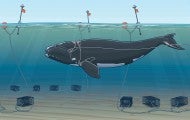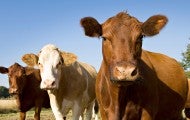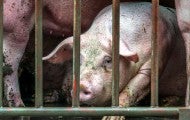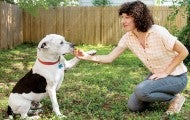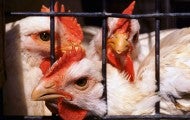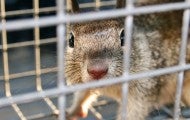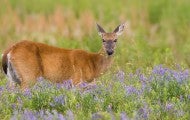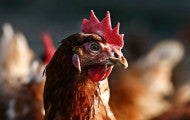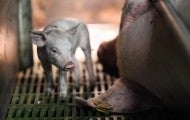Flying back and forth over Cape Cod Bay, a survey plane spotted a half dozen of the world’s rarest creatures: North Atlantic right whales. Such sightings are good news. The species hovers near extinction—by one estimate, fewer than 360 remain. Each time researchers locate a whale, they take pictures...
TRENTON, N.J.—Today, a bill to ban the crates used to cruelly confine mother pigs and calves raised for veal was signed into law by Gov. Phil Murphy. The bill is sponsored by Senator Vin Gopal and Assemblyman Raj Mukherji. It passed the state Senate in June 2023 and state Assembly in May 2023. The...
Today, the New York state legislature passed a bill that ends inhumane wildlife killing contests, in which participants compete to kill the most, the heaviest and the smallest animals for cash and prizes. In 2018 and 2020, the Humane Society of the United States released undercover investigations...
The Humane Society of the United States and the Humane Society Legislative Fund are noted champions for the protection and well-being of the nation’s wild horses and burros, and we have strong policy and practical commitments to the humane management of their herds on America’s Western ranges. We...
(Each report is available as a downloadable PDF.) Pigs About Pigs [PDF] Animal Welfare in the Pig Industry [PDF] Economics of Alternatives to Gestation Crates [PDF] The Welfare of Intensively Confined Animals [PDF] Scientists and Experts: Gestation Crates [PDF] Welfare Issues with Gestation Crates...
This press release was updated at 2:35 p.m. EST on May 23, 2024. WASHINGTON—Pig producers, pork distributors and animal advocates decried the House of Representatives’ Farm Bill (the Farm, Food, and National Security Act of 2024) that will likely be voted out of the Agriculture Committee today. They...
Poultry (Each report is available as a downloadable PDF.) CHICKENS AND TURKEYS About Chickens [PDF] About Turkeys [PDF] Animal Welfare in the Chicken Industry [PDF] Animal Welfare in the Turkey Industry [PDF] Caponizing Chickens [PDF] Manual Catching of Poultry [PDF] Transport of Day-Old Chicks [PDF...
WASHINGTON — On January 1, California’s 2018 ballot measure Proposition 12, which set landmark prohibitions on the sale of food products from farm animals locked in cruel and extreme confinement, will be fully implemented in the state. Proposition 12’s egg and veal provisions have been in place for...
This list is provided as a resource for horse owners and is for informational purposes only. Please contact specific vendors for more information on their services. Every effort has been made to ensure the accuracy of all listings. This list is not exhaustive and is subject to change over time. The...
A raccoon in the chimney, a groundhog under the shed, a skunk under the back porch … when confronted with wildlife living up-close in their own homes or backyards, well-meaning but harried homeowners often resort to what they see as the most humane solution—live-trapping the animal and then setting...
Around the world, animals used for meat, eggs and dairy often suffer on factory farms where they are treated as units of production rather than living, feeling creatures. The Humane Society of the United States and Humane Society International present comprehensive reports on animal agribusiness and...
On a longline fishing boat off the Galapagos Islands, a concerned biologist working undercover as a cook films a horrifying scene. As the camera rolls, a blue shark is dragged upside down out of the water, a sharp hook piercing it through the roof of the mouth and out through the side of the face...
